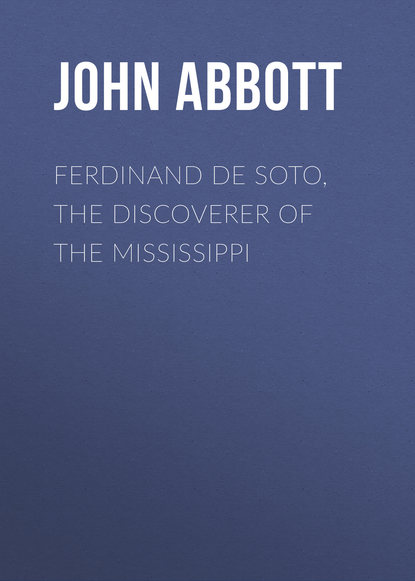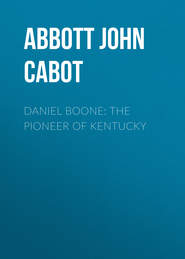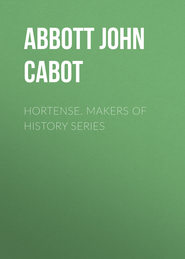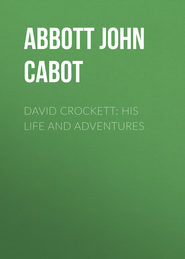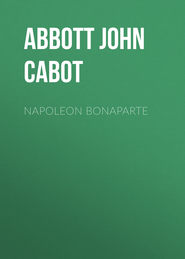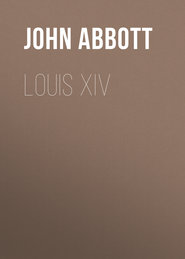По всем вопросам обращайтесь на: info@litportal.ru
(©) 2003-2024.
✖
Ferdinand De Soto, The Discoverer of the Mississippi
Настройки чтения
Размер шрифта
Высота строк
Поля
"We want no peace with you. War only we want; a war of fire and blood."
As De Soto, troubled by this message, moved cautiously forward, he found an army of fifteen hundred natives drawn up on the banks of the stream to prevent the passage; while the opposite banks were occupied by between six and seven thousand warriors, extending up and down the river for a distance of six miles. There was nothing for the Spaniards to do but to press forward. To turn back, in sight of their foes, was not to be thought of. After a pretty sharp skirmish, in which the Spaniards attacked their opponents, the natives sprang into their canoes, and some by swimming crossed the river and joined the main body of the Indians upon the opposite bank.
Here they were obviously prepared, to make a desperate resistance. Night came on, dark and chill. The Spaniards bivouacked on the open plain, awaiting the morning, when, with but about seven hundred men, they were to assail eight thousand warriors, very strongly posted on bluffs, with a deep and rapid river flowing at their feet. The Indians gave the Spaniards no repose. During the darkness they were continually passing the river at different points in their canoes, and then uniting in one band, with hideous outcries assailing the weary travellers. The military genius of De Soto successfully beat them off through the night. He then intrenched himself so as to bid defiance to their attacks, and employed one hundred of his most skilful workmen in building, under the concealment of a neighboring grove, two very large flat boats.
Twelve days passed before these barges were finished. By the aid of men and horses, they were brought to the river and launched. In the morning, before the dawn, ten mounted horsemen and forty footmen embarked in each boat, the footmen to ply the oars as vigorously as possible in the rapid passage of the river to a designated spot, where the horsemen were immediately to spur their steeds upon the shore, and with their sabres open a passage for the rest of the troops. De Soto was anxious to pass in the first boat, but his followers entreated him not to expose his life, upon which everything depended, to so great a peril.
The moment the boats were dimly seen by the watchful natives, a signal war-whoop rang along the bank for miles. Five hundred warriors rushed to the menaced spot, to prevent the landing. Such a shower of arrows was thrown upon the boat that every man was more or less wounded. The moment the bows touched the beach, the steel-clad horsemen plunged upon the foe, and cut their way through them with blood-dripping sabres. Other native warriors were however hurrying to the assistance of their comrades. In the meantime the boats had with great rapidity recrossed the river, and brought over another detachment of eighty men with De Soto himself at their head. After a sanguinary conflict the Spaniards obtained complete possession of the landing place. Though unimportant skirmishes were kept up through the day, the remaining troops were without difficulty brought across the river. At nightfall not an Indian was to be seen. They had all withdrawn and fortified themselves with palisades in a neighboring swamp.
The Spaniards found opening before them a beautiful and fertile country, well cultivated, with fields of corn and beans, and with many small villages and comfortable farm-houses scattered around. They broke up their boats for the sake of the nails, which might prove of priceless value to them in their future operations. Leaving the Indians unmolested in their fortress, they journeyed on five days in a westerly direction, when they reached the banks of another large river, which is supposed to have been the Tombigbee.
Here De Soto found hostile Indians arrayed on the opposite bank, ready to oppose his passage. Anxious to avoid, if possible, any sanguinary collision with the natives, he tarried for two days, until a canoe had been constructed by which he could send a friendly message across to the chief. A single unarmed Indian was dispatched in the canoe with these words of peace. He paddled across the river, and as soon as the canoe touched the shore the savages rushed upon him, beat out his brains with their war-clubs, and raising yells of defiance, mysteriously disappeared.
There being no longer any foe to oppose the passage, the troops were easily conveyed across on rafts. Unassailed, they marched tranquilly on for several days, until, on the 18th of December, they reached a small village called Chickasaw. It was pleasantly situated on a gentle eminence, embellished with groves of walnut and oak trees, and with streams of pure water running on either side. It is supposed that this village was on the Yazoo river, in the upper part of the State of Mississippi, about two hundred and fifty miles northwest of Mobile.
It was midwinter, and upon those high lands the weather was intensely cold. The ground was frequently encumbered with snow and ice, and the troops, unprovided with winter clothing, suffered severely. De Soto decided to take up his winter quarters at Chickasaw, there to await the returning sun of spring. There appears to have been something senseless in the wild wanderings in which De Soto was now persisting, which have led some to suppose that care, exhaustion, and sorrow had brought on some degree of mental derangement. However that may be, he devoted himself with great energy to the promotion of the comfort of his men. Foraging parties were dispatched in all directions in search of food and of straw for bedding, while an ample supply of fuel was collected for their winter fires.
There were two hundred comfortable houses in this village, and De Soto added a few more, so that all of his men were well sheltered. So far as we can judge from the narratives given, the native inhabitants, through fear of the Spaniards, had abandoned their homes and fled to distant parts. De Soto did everything in his power to open friendly relations with the Indians. He succeeded, through his scouts, in capturing a few, whom he sent to their chief laden with presents, and with assurances of peace and friendship.
The Cacique returned favorable replies, and sent to De Soto in return fruit, fish, and venison. He, however, was very careful not to expose his person to the power of the Spaniards. His warriors, in gradually increasing numbers, ventured to enter the village, where they were treated by De Soto with the greatest consideration. He had still quite a large number of swine with him, for they had multiplied wonderfully on the way. The Indians, having had a taste of pork, found it so delicious that they began to prowl around the encampment by night to steal these animals. It is said that two Indians who were caught in the act were shot, and as this did not check the thievery, a third had both his hands chopped off with a hatchet, and thus mutilated was sent to the chief as a warning to others.
It is with great reluctance that we give any credence to this statement. It certainly is not sustained by any evidence which would secure conviction in a court of justice. It is quite contrary to the well-established humanity of De Soto. There can be no possible excuse for such an act of barbarity on the part of any civilized man. If De Soto were guilty of the atrocity, it would, indeed, indicate that his reason was being dethroned.
The chief had taken up his residence about three or four miles from the village. Four of the Spanish soldiers one night, well armed, stole from their barracks, in direct violation of orders, and repairing to the dwelling of the Cacique, robbed him of some rich fur mantles, and other valuable articles of clothing. With that even-handed justice which has thus far characterized De Soto, he who had ordered two Indians to be shot for stealing his swine, now ordered the two ringleaders in this robbery of the Indian chief to be put to death.
The priests in the army, and most of the officers, earnestly implored De Soto to pardon the culprits. But he was inflexible. He would administer equal justice to the Indian and the Spaniard. The culprits were led into the public square to be beheaded. It so happened that, just at that time, an embassage arrived from the Cacique with complaints of the robbery, and demanding the punishment of the offenders. Juan Ortiz, the interpreter, whose sympathies were deeply moved in behalf of his comrades about to be executed, adopted the following singular and sagacious expedient to save them:
He falsely reported to the Governor that the chief had sent his messengers to implore the forgiveness of the culprits – to say that their offence was a very slight one, and that he should regard it as a personal favor if they were pardoned and set at liberty. The kind-hearted De Soto, thus delivered from his embarrassment, gladly released them.
On the other hand, the tricky interpreter sent word to the Cacique that the men who had robbed him were in close imprisonment, and that they would be punished with the utmost severity, so as to serve as a warning to all others.
Many circumstances led De Soto to the suspicion that the chief was acting a treacherous part; that he was marshalling an immense army in the vicinity to attack the Spaniards; that his pretended friendliness was intended merely to disarm suspicion, and that the warriors who visited the village were spies, making preparation for a general assault. In this judgment subsequent events proved him to be correct.
Early in the month of March there was a dark and stormy night, and a chill north wind swept the bleak plains. The sentinels were driven to seek shelter; no one dreamed of peril. It was the hour for the grand assault. Just at midnight the Cacique put his martial bands in motion. They were in three powerful divisions, the central party being led by the chief in person. These moccasoned warriors, with noiseless tread, stealthily approached their victims. Suddenly the air resounded with war-whoops, blasts of conch shells, and the clangor of wooden drums, rising above the roar of the storm, when the savages, like spirits of darkness, rushed upon the defenceless village. They bore with them lighted matches, made of some combustible substance twisted in the form of a cord, which, being waved in the air, would blaze into flame. The village was built of reeds, with thatch of dried grass. The torch was everywhere applied; the gale fanned the fire. In a few minutes the whole village was a roaring furnace of flame.
What pen can describe the scene which ensued of tumult, terror, blood, and woe! What imagination can conceive of the horrors of that night, when uncounted thousands of savages, fierce as demons, rushed upon the steel-clad veterans of Spain, not one of whom would ask for quarter! every one of whom would fight with sinewy arm and glittering sabre to the last possible gasp.
Nothing could throw the veteran Spaniards into a panic. They always slept prepared for surprise. In an instant every man was at his post. De Soto, who always slept in hose and doublet, drew his armor around him, mounted his steed ever ready, and was one of the first to dash into the densest of the foe. Twelve armored horsemen were immediately at his side. The arrows and javelins of the natives glanced harmless from helmet and cuirass, while every flash of the long, keen sabres was death to an Indian, and the proud war-horses trampled the corpses beneath their feet.
The fierce conflagration soon drove all alike out into the plain. Many of the Spaniards could not escape, but perished miserably in the fire. Several of the splendid horses were also burned. Soon all were engaged hand to hand, fighting in a tumultuous mass by the light of the conflagration. There was, perhaps, alike bravery on either side. But the natives knew that if defeated they could flee to the forests; while to the Spaniards defeat was certain death, or captivity worse than death to every one.
De Soto observed not far from him an Indian chief of herculean strength, who was fighting with great success. He closed in upon him, and as he rose in his saddle, leaning mainly upon the right stirrup, to pierce him with his lance, the saddle, which in the haste had not been sufficiently girded, turned beneath him, and he was thrown upon the ground in the midst of the enemy. His companions sprang to the rescue. Instantly he remounted, and was again in the thickest of the foe. The battle was fierce, bloody, and short. So many of the horsemen had perished during their long journey that many of the foot soldiers were protected by armor. At length the savages were put to flight. Pursued by the swift-footed horses, they, in their terror, to add speed to their footsteps, threw away their weapons, and thus fell an easy prey to the conqueror.
The Spaniards, justly exasperated in being thus treacherously assailed by those who had assumed the guise of friendship, pursued the fugitives so long as they could be distinguished by the light of the conflagration, and cut them down without any mercy. A bugle-blast then sounded the recall. The victors returned to an awful scene of desolation and misery. Their homes were all in ashes, and many of the few comforts they had retained were consumed. Forty Spaniards had been slain, besides many more wounded. Fifty horses had perished in the flames, or had been shot by the natives. Their herd of swine, which they prized so highly, and which they regarded as an essential element in the establishment of their colony, had been shut up in an enclosure roofed with straw, and nearly every one had perished in the flames.
This disaster was the most severe calamity which had befallen them. Since landing at Tampa Bay, over three hundred men had fallen from the attacks of the natives. De Soto was thrown into a state of the deepest despondency. All hope seemed to be extinguished. World-weary, and in despair, he apparently wished only to die. Distress was all around him, with no possibility of his affording any relief. Sadly he buried the dead of his own army, while he left the bodies of the natives thick upon the plain, a prey for wolves and vultures. The smouldering ruins of Chickasaw were abandoned, and an encampment was reared of logs and bark at a distance of about three miles; where they passed a few weeks of great wretchedness. Bodily discomfort and mental despondency united in creating almost intolerable gloom.
Terribly as the natives had been punished they soon learned the extent of the calamity they had inflicted upon the Spaniards. Through their spies they ascertained their diminished numbers, witnessed their miserable plight, and had the sagacity to perceive that they were very poorly prepared to withstand another attack. Thus they gradually regained confidence, marshalled their armies anew, and commenced an incessant series of assaults, avoiding any general action, and yet wearing out the Spaniards with the expectation of such action every hour of every night.
In the daytime, De Soto sent out his horsemen to scour the country around in all directions for a distance of ten or twelve miles. They would return with the declaration that not a warrior was to be found. But before midnight the fleet footed savages would be swarming around the encampment, with hideous yells, often approaching near enough to throw in upon it a shower of arrows. Occasionally these skirmishes became hotly contested. In one of them forty Indians were slain, while two of the horses of the Spaniards were killed and two severely wounded.
In their thin clothing the Spaniards would have suffered terribly from the severe cold of the nights, but for the ingenuity of one of their number, who invented a soft, thick, warm matting or coverlet which he wove from some long grass that abounded in the vicinity. Every soldier was speedily engaged in the manufacture of these beds or blankets. They were made several inches in thickness and about six feet square. One half served as a mattress, and the other folded over, became a blanket. Thus they were relieved from the cold, which otherwise would have been almost unendurable.
The foraging parties succeeded in obtaining a supply of corn, beans, and dried fruit. Here De Soto was compelled to remain, to heal his wounded, for the remainder of the month of March. He was very anxious to escape from the hostile region as soon as possible. As an illustration of the scenes which were occurring almost every night during this sad encampment, we may mention the following.
The night was cold and dark. The defiant war-cries of the savages were heard in all directions and no one could tell how great their numbers, or upon what point their attack would fall. Several camp-fires were built, around which horsemen were assembled ready to meet the foe from whatever point, in the darkness, he might approach. Juan De Gusman was the leader of one of these bands. He was a cavalier of high renown. In figure, he was delicate, almost feminine, but he had the soul of a lion.
By the light of the blazing fagots, he discerned a numerous band of Indians stealthily approaching. Leaping upon his horse, and followed by five companions, and a few armored footmen, he plunged into the midst of them. He aimed his javelin, at apparently the leader of the savages, a man of gigantic stature. The Indian wrenched the lance from his hand, seized him by the collar, and hurled him from his saddle to the ground. Instantly the soldiers rushed in, with their sabers, cut the savage to pieces and after a short conflict in which a large number of the natives were slain, put the rest to flight.
It may seem strange that so few of the Spaniards were killed in these terrible conflicts, in which they often cut down hundreds and even thousands of their foes. But it should be remembered that their coats of mail quite effectually protected them from the flint pointed arrows of the Indians. The only vulnerable point was the face, and even this was sometimes shielded by the visor. But the bodies of the natives, thinly clad, were easily cut down by the steel blades of the cavaliers.
CHAPTER XVII
The Discovery of the Mississippi
The Fortress of Hostile Indians. – Its Capture. – The Disastrous Conflict. – The Advance of the Army. – Discovery of the Mississippi River. – Preparations for Crossing. – Extraordinary Pageants. – Unjustifiable Attack. – The passage of the River. – Friendly Reception by Casquin. – Extraordinary Religious Festival.
On the first day of April, 1541, the army broke up its encampment, and again set out languidly on its journey to the westward. No sounds of joy were heard, for there was no longer hope to cheer. The indomitable energy of De Soto dragged along the reluctant footsteps of his troops. The first day they travelled about twelve miles, through a level and fertile country with many villages and farm houses to charm the eye. At night they encamped beyond the territory of Chickasaw, and consequently supposed that they would no longer be molested, by those hostile Indians.
A well armed party of cavalry and infantry was sent out on a foraging expedition. They accidently approached a strong fortress where a large number of Indian warriors was assembled, prepared to resist their march. They were very fantastically clothed, and painted in the highest style of barbaric art, so as to render them as hideous as possible. Immediately upon catching sight of the Spaniards they rushed out upon them with ferocious cries. Añasco, who was in command of the Spanish party, seeing such overwhelming numbers coming upon him, retreated to an open field, where he drew up his horses and placed his cross-bow men in front with their bucklers, to protect the precious animals. At the same time he sent hastily back to De Soto for reinforcements.
The Indians came rushing on, clashing their weapons, beating wooden drums and raising the war-whoop, till they arrived within reach of the arrows of the cross-bow men. Then, somewhat appalled by the formidable military array of the Spaniards glittering in steel armor, they stopped and taunted their foes from the distance, with cries of defiance and gestures of insolence and insult.
The hot-headed Añasco found it hard to restrain his impatience. Soon De Soto himself came, with all his force, except a few left to guard the camp. Carefully he scrutinized the fortress where these savages had gathered their strength to crush him. It was indeed a formidable structure: consisting of a quadrangle twelve hundred feet square. There were three entrance gates, purposely so low that mounted men could not enter. In the rear of the fortress there was a deep and rapid river with steep banks, probably the Yazoo; in the county of Tallahatchee. The fort was called the Alabama. Across this stream, frail bridges were constructed, over which the Indians, in case of necessity, could retreat, and easily destroy the bridges behind them. Directly in the rear of the front entrance, there was a second wall, and in the rear of that a third; so that if the outer wall were gained, the garrison could retreat behind one and the other.
De Soto very carefully reconnoitred the fort. He judged that the slightest appearance of timidity, on his part, would so embolden the savages as to expose him to great peril. Should he avoid the conflict, to which he was challenged, and endeavor to escape, by fleeing before his enemies, he would draw them down upon him with resistless fury. Thus again he found himself impelled to rouse all the energies of his army for the slaughter of the poor savages.
He formed his attacking force in three columns, to seize the three entrances. The Indians, carefully noting these preparations, made a simultaneous rush upon the Spaniards, pouring in upon them an incessant volley of flint-pointed arrows. Notwithstanding the armor, many of the Spaniards were wounded, the savages taking careful aim at those parts which were least protected. The three storming columns pressed vigorously on, while two bands of horsemen, twenty in each, De Soto leading one of them, attacked the tumultuous foe on each flank. The assault was resistless. The panic-stricken savages fled to the fortress. The entrances were clogged by the crowd, and horsemen and footmen, with their long sharp sabres cut down their foes with enormous slaughter.
In the heat of the conflict an arrow, thrown by the sinewy arm of an Indian, struck the steel casque of De Soto with such force that it rebounded some sixteen feet in the air. The blow was so severe that it almost unhorsed the Governor, and seemingly caused, as he afterwards said, the fire to flash from his eyes. As the savages rushed pell-mell into the fortress, their pursuers were at their heels, cutting them down. The Spaniards were exasperated. They had sought peace, and had found only war. De Soto had wished, in a friendly spirit, to traverse their country, and they were hedging up his way and pursuing him with relentless ferocity. He assumed that it was necessary, for the salvation of his army, to teach them a lesson which they would not soon forget.
The carnage within the fortress was dreadful. All was inextricable confusion. It was a hand-to-hand fight. Wooden swords fell harmless upon helmet, cuirass and buckler. But the keen and polished steel of the Spaniards did fearful execution upon the almost naked bodies of the Indians. Some climbed the palisades and leaped down into the plain, where they were instantly slain by the mounted troops. Others crowded through the fort and endeavored to escape by the narrow bridges. Many were jostled off, and in the swift current were drowned. But a few moments elapsed ere the fort was in the hands of the Spaniards. Its floor was covered by the gory bodies of the slain. Still, not a few had escaped, some by swimming, some by the bridges. They immediately formed in battle array upon the opposite bank of the river, where they supposed they were beyond the reach of the Spaniards.
Again they raised shouts of defiance and insult. De Soto was not in a mood to endure these taunts. Just above the fort he found a ford. Crossing with a squadron of horsemen, they rushed with gleaming sabres upon the savages, and put them instantly to flight. For more than three miles they pursued them over the plain, till wearied with slaughter. They then returned, victors, slowly and sadly to their encampment. Peace and friendship would have been far preferable to this war and misery. Even their victory was to the Spaniards a great disaster, for several of the men were slain, and many severely wounded. Of the latter, fifteen subsequently died. De Soto remained four days in the encampment, nursing the wounded, and then resumed his weary march.
He still directed his footsteps in a westerly direction, carefully avoiding an approach to the sea, lest his troops should rise in mutiny, send for the ships, and escape from the ill-starred enterprise. This certainly indicates, under the circumstances, an unsound, if not a deranged mind. For four days the troops toiled along through a dismal region, uninhabited, and encumbered with tangled forests and almost impassable swamps.
At length they came to a small village called Chisca, upon the banks of the most majestic stream they had yet discovered. Sublimely the mighty flood, a mile and a half in width, rolled by them. The current was rapid and bore upon its bosom a vast amount of trees, logs, and drift-wood, showing that its sources must be hundreds of leagues far away, in the unknown interior. This was the mighty Mississippi, the 'father of waters.' The Indians, at that point, called it Chucagua. Its source and its embouchure were alike unknown to De Soto. Little was he then aware of the magnitude of the discovery he had made.
"De Soto," says Mr. Irving, "was the first European who looked out upon the turbid waters of this magnificent river; and that event has more surely enrolled his name among those who will ever live in American history, than if he had discovered mines of silver and gold."
The Spaniards had reached the river after a four days' march through an unpeopled wilderness. The Indians of Chisca knew nothing of their approach, and probably had never heard of their being in the country. The tribe inhabiting the region of which Chisca was the metropolis, was by no means as formidable, as many whom they had already encountered. The dwelling of the Cacique stood on a large artificial mound, from eighteen to twenty feet in height. It was ascended by two ladders, which could of course be easily drawn up, leaving the royal family thus quite isolated from the people below.
Chisca, the chieftain, was far advanced in years, a feeble, emaciate old man of very diminutive stature. In the days of his prime, he had been a renowned warrior. Hearing of the arrival of the Spaniards, he was disposed to regard them as enemies, and seizing his tomahawk, he was eager to descend from his castle and lead his warriors to battle.
The contradictory statements are made that De Soto, weary of the harassing warfare of the winter, was very anxious to secure the friendship of these Indians. Unless he were crazed, it must have been so, for there was absolutely nothing to be gained, but everything to be imperilled, by war. On the other hand, it is said that the moment the Spaniards descried the village, they rushed into it, plundering the houses, seizing men and women as captives. Both statements may have been partially true. It is not improbable that the disorderly troops of De Soto, to his great regret, were guilty of some outrages, while he personally might have been intensely anxious to repress this violence and cultivate only friendly relations with the natives.
But whatever may have been the hostile or friendly attitude assumed by the Spaniards, it is admitted that the Cacique was disposed to wage war against the new comers. The more prudent of his warriors urged that he should delay his attack upon them until he had made such preparations as would secure successful results.





